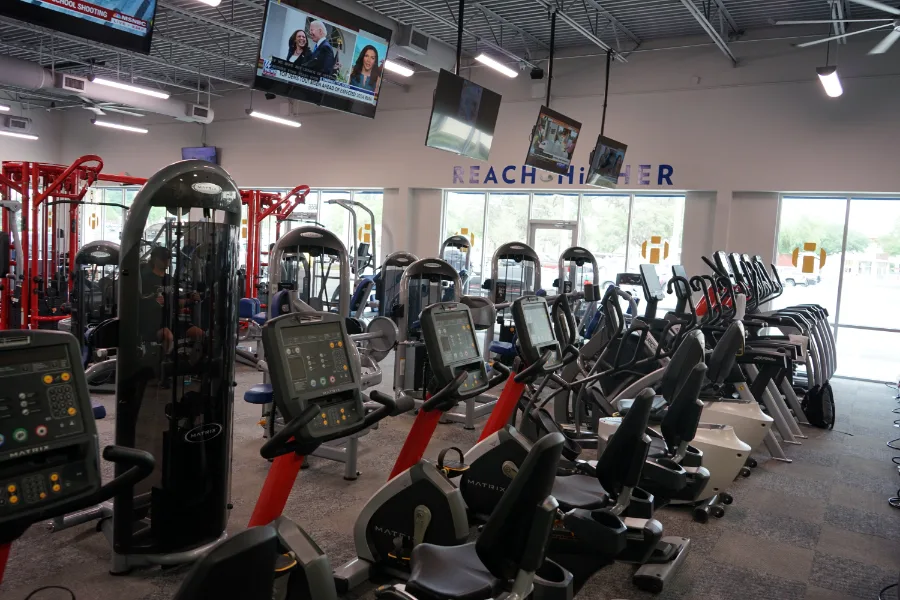Confronting the twin challenges of losing fat and gaining muscle can often feel like an uphill battle, especially for men seeking tangible results in their fitness journey. This guide is meticulously crafted to address common obstacles men face, from navigating complex nutritional information to finding a workout regimen that truly works. It’s designed to provide clear, practical solutions that demystify the process of body transformation, making it both achievable and sustainable
The science of body transformation
Body recomposition is the process of building muscle and losing fat simultaneously. It’s the holy grail of fitness, a challenging but not impossible feat. It’s a science-backed approach that combines diet, exercise, and lifestyle changes.
The first thing to understand is that our bodies are in a constant state of flux, breaking down and rebuilding tissues. When you exercise, you create micro-tears in your muscles. Your body repairs these tears, leading to muscle growth. On the other hand, fat loss occurs when you burn more calories than you consume, forcing your body to use stored fat for energy.
However, these two processes require different conditions. Building muscle requires a calorie surplus while losing fat needs a calorie deficit. So, how can you do both at the same time? The answer lies in the intricate dance of macronutrients, exercise, sleep, and stress management.
Balancing muscle gain and fat loss
The key to body recomposition is striking a balance between muscle gain and fat loss. It’s about fine-tuning your diet and exercise regime to create the perfect conditions for both processes to occur simultaneously.
When it comes to diet, it’s not just about how much you eat, but what you eat. Consuming enough protein is crucial for muscle growth, as it provides the building blocks your body needs to repair and grow muscles. At the same time, you need to keep your overall calorie intake in check to ensure you’re burning fat.
As for exercise, it’s a delicate balance between strength training and cardio. Strength training is non-negotiable if you want to build muscle. But you can’t neglect cardio, as it’s key to heart health
Want to understand the optimal duration of a HIIT workout?
Optimal nutritional strategies for dual goals
Caloric balance is the cornerstone of body recomposition. To simultaneously lose fat and gain muscle, your body needs to be in a slight calorie deficit. This means consuming fewer calories than you burn, but not so much that your body can’t build muscle. The precise number varies for everyone, so it’s worth consulting a nutritionist or fitness professional to find your sweet spot.
The importance of protein in body recomposition
Protein is the MVP of nutrients when it comes to body recomposition. It’s essential for muscle repair and growth, and it also helps you feel fuller for longer, making it easier to stick to your calorie goals. Aim for around 1 gram of protein per pound of body weight each day, and try to spread your intake evenly across your meals.
Embracing whole foods for optimal health
Whole foods should form the backbone of your diet. These are foods that have been minimally processed and are close to their natural state. They’re packed with vitamins, minerals, and fiber, and tend to be lower in calories than processed foods. They also provide the complex carbs and healthy fats your body needs for energy and overall health.
Post-workout nutrition essentials
The post-workout period is a crucial window for muscle recovery and growth. Aim to consume a balanced meal or snack within an hour of finishing your workout. This meal should include both protein, to support muscle repair, and carbohydrates, to replenish glycogen stores.
Cutting down on sugary beverages
Sugary beverages are a major source of empty calories. They provide little nutritional value and can easily push you over your daily calorie limit. Instead, hydrate with water, herbal teas, or infusions. If you miss the fizz of sodas, try sparkling water with a splash of fruit juice. And remember, this includes cutting down on alcohol too, which is often high in sugar and can inhibit muscle growth.
The role of fiber in fat loss and muscle gain
Fiber is the unsung hero of a healthy diet. It’s not only essential for digestion, but it also helps you feel full, which can curb overeating. Plus, some types of fiber can support gut health, which plays a role in everything from immunity to mental well-being. Aim to incorporate a variety of fiber-rich foods into your diet, such as fruits, vegetables, whole grains, and legumes. This will not only support your body recomposition goals but also contribute to your overall health.
Blueprint for building muscle while shedding fat
Here are expert tips for your nutrition if you are looking to build muscle and lose fat.
The benefits of healthy fats in your diet
Healthy fats are a vital part of your nutrition plan. They not only provide energy but also aid in nutrient absorption, hormone production, and even inflammation reduction. Foods like avocados, nuts, seeds, and fatty fish should be a part of your regular menu. Remember, not all fats are created equal. Trans fats and excessive saturated fats can harm your health, so make sure you’re focusing on those beneficial monounsaturated and polyunsaturated fats.
Why high-protein diets are essential
A high-protein diet is non-negotiable if you’re aiming for body recomposition. Protein is the building block of muscle and helps repair the damage caused by strength training. It also keeps you satiated, preventing overeating during your calorie-controlled diet. Lean meats, fish, eggs, dairy, beans, and legumes are all excellent sources of protein.
Calorie deficit: Finding the sweet spot
Finding the right calorie deficit is a delicate balancing act. Cut too many calories, and your body won’t have the energy it needs to build muscle. Cut too few, and you won’t lose fat. Aim for a moderate deficit that allows you to lose weight at a rate of about 0.5-1% of your body weight per week.
Vitamin D: The overlooked nutrient in muscle-building
Vitamin D is often overlooked when it comes to muscle building, but it plays a crucial role in bone health and muscle function. It can also boost testosterone levels, promoting muscle growth. Sunlight is the best source of vitamin D, but it can also be found in foods like fatty fish, egg yolks, and fortified dairy products. If you live in a place with limited sunlight, you might want to consider a vitamin D supplement, but always consult with a healthcare professional first.
Strength training: The cornerstone of muscle gain
When it comes to exercise, strength training is the key to muscle gain. By challenging your muscles, you create microscopic tears that your body then repairs, leading to muscle growth. Aim for two to three strength training sessions per week, focusing on compound movements like squats, deadlifts, and bench presses that work for multiple muscle groups at once. And remember, progress takes time. Consistency is the name of the game. Increase the weight you’re lifting gradually, and don’t be discouraged if you don’t see immediate results. Your body is changing, even if you can’t see it yet.
Supplements: Do they help in body recomposition?
Supplements can be a useful addition to your nutrition plan, but they’re not magic bullets. They should supplement, not replace, a balanced diet. That said, some supplements can support your body’s recomposition goals.
Protein powder is a convenient way to ensure you’re getting enough protein, especially post-workout. Creatine can enhance strength and muscle gain, while branched-chain amino acids (BCAAs) could aid in muscle recovery.
For fat loss, caffeine can slightly boost your metabolism, and green tea extract could help increase fat burn. However, it’s important to remember that these effects are relatively small and should not replace a healthy diet and regular exercise.
Always consult a healthcare professional before starting a new supplement regimen, especially if you have any pre-existing health conditions or are taking medication.
Debunking myths around supplements
There’s a lot of misinformation floating around about supplements. Let’s clear up a few things:
First, supplements are not a shortcut. They can support your goals, but they won’t do the work for you. You still need to maintain a balanced diet and consistent exercise routine.
Second, more is not always better. Taking too much of certain supplements can actually be harmful. Stick to the recommended doses, and again, consult a healthcare professional if you’re unsure.
Finally, not all supplements are created equal. Do your research and opt for reputable brands.
Final thoughts
Achieving body recomposition – losing fat and gaining muscle at the same time – is a delicate dance of nutrition, exercise, and lifestyle changes. It requires a deep understanding of your body’s needs and a careful balance of your diet and workouts.
Remember, it’s not just about looking a certain way, but about building a healthier, stronger body that can serve you well in all areas of life. So, focus on whole, nutrient-dense foods, prioritize strength training, and consider supplements that could support your journey.
Lastly, patience is key. Body recomposition is a slow process, and progress might not always be visible on the scale. Trust in the process, stay consistent, and over time, you’ll see the fruits of your labor. Here’s to a stronger, leaner you!





